Thien Nguyen
Modality-Specific Enhancement and Complementary Fusion for Semi-Supervised Multi-Modal Brain Tumor Segmentation
Dec 10, 2025Abstract:Semi-supervised learning (SSL) has become a promising direction for medical image segmentation, enabling models to learn from limited labeled data alongside abundant unlabeled samples. However, existing SSL approaches for multi-modal medical imaging often struggle to exploit the complementary information between modalities due to semantic discrepancies and misalignment across MRI sequences. To address this, we propose a novel semi-supervised multi-modal framework that explicitly enhances modality-specific representations and facilitates adaptive cross-modal information fusion. Specifically, we introduce a Modality-specific Enhancing Module (MEM) to strengthen semantic cues unique to each modality via channel-wise attention, and a learnable Complementary Information Fusion (CIF) module to adaptively exchange complementary knowledge between modalities. The overall framework is optimized using a hybrid objective combining supervised segmentation loss and cross-modal consistency regularization on unlabeled data. Extensive experiments on the BraTS 2019 (HGG subset) demonstrate that our method consistently outperforms strong semi-supervised and multi-modal baselines under 1\%, 5\%, and 10\% labeled data settings, achieving significant improvements in both Dice and Sensitivity scores. Ablation studies further confirm the complementary effects of our proposed MEM and CIF in bridging cross-modality discrepancies and improving segmentation robustness under scarce supervision.
Semi-MoE: Mixture-of-Experts meets Semi-Supervised Histopathology Segmentation
Sep 17, 2025Abstract:Semi-supervised learning has been employed to alleviate the need for extensive labeled data for histopathology image segmentation, but existing methods struggle with noisy pseudo-labels due to ambiguous gland boundaries and morphological misclassification. This paper introduces Semi-MOE, to the best of our knowledge, the first multi-task Mixture-of-Experts framework for semi-supervised histopathology image segmentation. Our approach leverages three specialized expert networks: A main segmentation expert, a signed distance field regression expert, and a boundary prediction expert, each dedicated to capturing distinct morphological features. Subsequently, the Multi-Gating Pseudo-labeling module dynamically aggregates expert features, enabling a robust fuse-and-refine pseudo-labeling mechanism. Furthermore, to eliminate manual tuning while dynamically balancing multiple learning objectives, we propose an Adaptive Multi-Objective Loss. Extensive experiments on GlaS and CRAG benchmarks show that our method outperforms state-of-the-art approaches in low-label settings, highlighting the potential of MoE-based architectures in advancing semi-supervised segmentation. Our code is available at https://github.com/vnlvi2k3/Semi-MoE.
A Survey on Long-Video Storytelling Generation: Architectures, Consistency, and Cinematic Quality
Jul 09, 2025

Abstract:Despite the significant progress that has been made in video generative models, existing state-of-the-art methods can only produce videos lasting 5-16 seconds, often labeled "long-form videos". Furthermore, videos exceeding 16 seconds struggle to maintain consistent character appearances and scene layouts throughout the narrative. In particular, multi-subject long videos still fail to preserve character consistency and motion coherence. While some methods can generate videos up to 150 seconds long, they often suffer from frame redundancy and low temporal diversity. Recent work has attempted to produce long-form videos featuring multiple characters, narrative coherence, and high-fidelity detail. We comprehensively studied 32 papers on video generation to identify key architectural components and training strategies that consistently yield these qualities. We also construct a comprehensive novel taxonomy of existing methods and present comparative tables that categorize papers by their architectural designs and performance characteristics.
Few-shot Continual Relation Extraction via Open Information Extraction
Feb 23, 2025
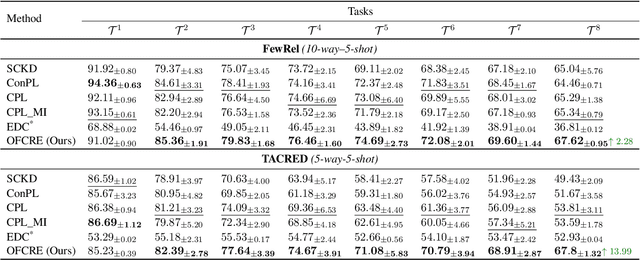
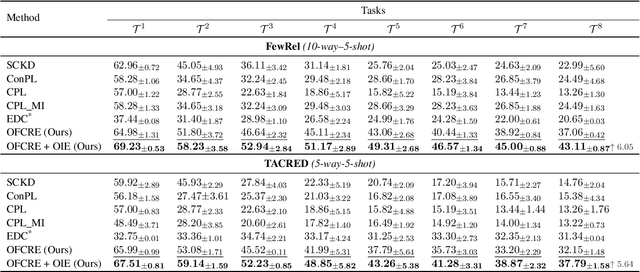
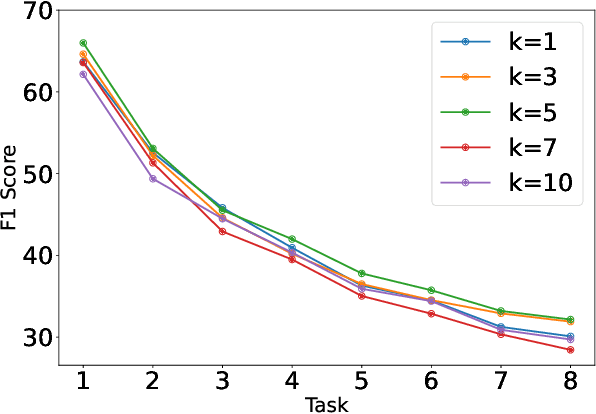
Abstract:Typically, Few-shot Continual Relation Extraction (FCRE) models must balance retaining prior knowledge while adapting to new tasks with extremely limited data. However, real-world scenarios may also involve unseen or undetermined relations that existing methods still struggle to handle. To address these challenges, we propose a novel approach that leverages the Open Information Extraction concept of Knowledge Graph Construction (KGC). Our method not only exposes models to all possible pairs of relations, including determined and undetermined labels not available in the training set, but also enriches model knowledge with diverse relation descriptions, thereby enhancing knowledge retention and adaptability in this challenging scenario. In the perspective of KGC, this is the first work explored in the setting of Continual Learning, allowing efficient expansion of the graph as the data evolves. Experimental results demonstrate our superior performance compared to other state-of-the-art FCRE baselines, as well as the efficiency in handling dynamic graph construction in this setting.
Leveraging Hierarchical Taxonomies in Prompt-based Continual Learning
Oct 06, 2024

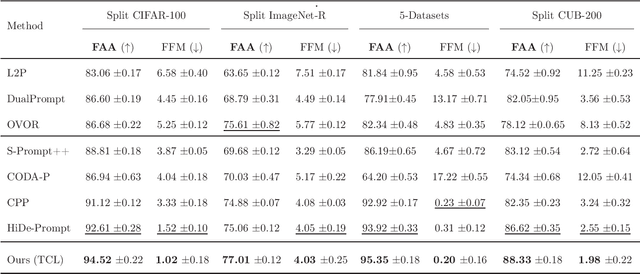
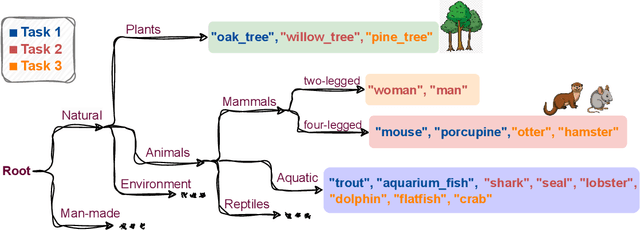
Abstract:Drawing inspiration from human learning behaviors, this work proposes a novel approach to mitigate catastrophic forgetting in Prompt-based Continual Learning models by exploiting the relationships between continuously emerging class data. We find that applying human habits of organizing and connecting information can serve as an efficient strategy when training deep learning models. Specifically, by building a hierarchical tree structure based on the expanding set of labels, we gain fresh insights into the data, identifying groups of similar classes could easily cause confusion. Additionally, we delve deeper into the hidden connections between classes by exploring the original pretrained model's behavior through an optimal transport-based approach. From these insights, we propose a novel regularization loss function that encourages models to focus more on challenging knowledge areas, thereby enhancing overall performance. Experimentally, our method demonstrated significant superiority over the most robust state-of-the-art models on various benchmarks.
Machine Learning Applications of Quantum Computing: A Review
Jun 19, 2024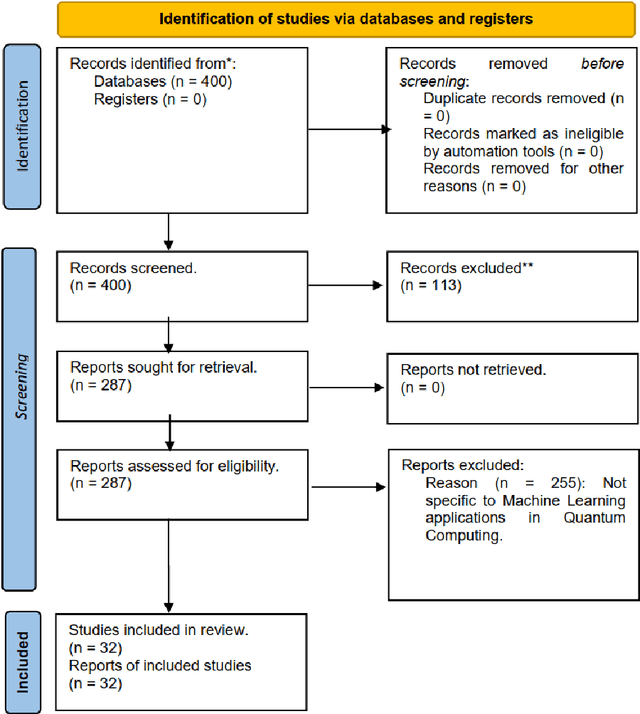



Abstract:At the intersection of quantum computing and machine learning, this review paper explores the transformative impact these technologies are having on the capabilities of data processing and analysis, far surpassing the bounds of traditional computational methods. Drawing upon an in-depth analysis of 32 seminal papers, this review delves into the interplay between quantum computing and machine learning, focusing on transcending the limitations of classical computing in advanced data processing and applications. This review emphasizes the potential of quantum-enhanced methods in enhancing cybersecurity, a critical sector that stands to benefit significantly from these advancements. The literature review, primarily leveraging Science Direct as an academic database, delves into the transformative effects of quantum technologies on machine learning, drawing insights from a diverse collection of studies and scholarly articles. While the focus is primarily on the growing significance of quantum computing in cybersecurity, the review also acknowledges the promising implications for other sectors as the field matures. Our systematic approach categorizes sources based on quantum machine learning algorithms, applications, challenges, and potential future developments, uncovering that quantum computing is increasingly being implemented in practical machine learning scenarios. The review highlights advancements in quantum-enhanced machine learning algorithms and their potential applications in sectors such as cybersecurity, emphasizing the need for industry-specific solutions while considering ethical and security concerns. By presenting an overview of the current state and projecting future directions, the paper sets a foundation for ongoing research and strategic advancement in quantum machine learning.
 Add to Chrome
Add to Chrome Add to Firefox
Add to Firefox Add to Edge
Add to Edge